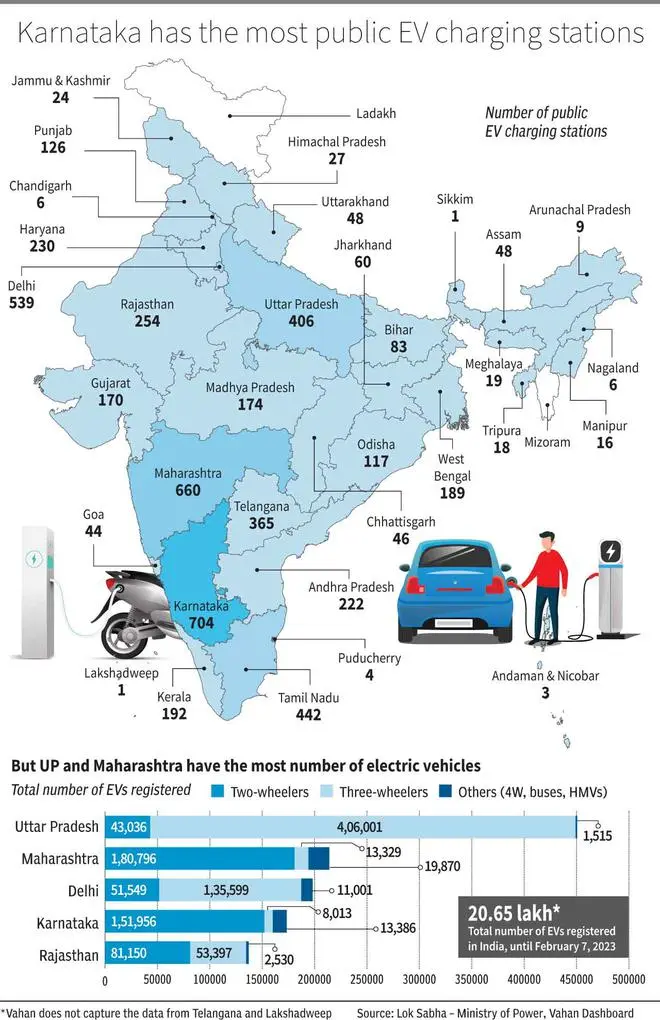The move towards green energy is leading to soaring electric vehicle sales in India. But India may not have enough infrastructure to cater to the demand from the rising number of electric vehicles.
As of January 23, 2023, India had 5,254 public electric vehicle (EV) charging stations, to cater to a total of 20.65 lakh EVs. This is according to the data revealed in Lok Sabha by Minister RK Singh and the Vahan dashboard. This means for every 393 electric vehicles in the country, there is one public charging station.
According to a white paper by Alvarez and Marsal, a global professional services firm, released in July 2022, “The global ideal EV/public chargers ratio is also around 6-20 EVs per public charger, whereas, in India, it currently stands at an estimated 135.”
According to the report, the EV to charger ratio in 2022 was 6 in China and the Netherlands, 19 in the US. The paper also recommended setting up approximately 46,000 more charging stations in the country.
While higher number of electric 2- and 3-wheelers, which are typically charged at home, reduces the requirement for public charging stations in India, the numbers do need to increase.

While answering another question, the ministry said that 316 charging stations were added in FY20, while 1,742 were added in FY21.
Even though this report wasn’t mentioned, the ministry said that “Action plans for 9 major cities have been prepared by the Bureau of Energy Efficiency (BEE) for installation of public charging stations. As per the initial estimates, a total of 46,397 public charging stations (PCS) are being targeted in these cities by 2030.”
States with the most chargers
Karnataka has the most EV charging stations in the country — 774 followed by Maharashtra with 660, Delhi with 539 and Tamil Nadu with 442 stations.
However, according to the Vahan data, most EVs in the country, 4.5 lakh of them, are registered in Uttar Pradesh. The State, however, has only 406 public EV charging stations, leaving one charging station for approximately 1,103 electric vehicles.
A majority of UP’s electric vehicles, 4.06 lakh of them, are electric three-wheelers, which include e-rickshaws. The State also has 43,036 electric two-wheelers. The number of electric cars and other big vehicles in the State is also quite low.
As of February 7, 2023, Maharashtra, Delhi, Karnataka and Rajasthan have the next most number of registered EVs at 2.12 lakh, 1.97 lakh, 1.71 lakh and 1.36 lakh respectively. Delhi and Rajasthan follow the same trend as that of UP, with most of their electric vehicles being two and three-wheelers.
However, in Maharashtra and Karnataka, the proportion of electric three-wheelers is lesser, compared to electric cars. Maharashtra has 17,216 and Karnataka has 10,249 electric cars.
Forty-three of all the charging stations are situated on 17 National Highways. NH-8, which runs from Karimganj in Assam to Sabroom in Tripura has nine charging stations, while NH-11 has 8.





Comments
Comments have to be in English, and in full sentences. They cannot be abusive or personal. Please abide by our community guidelines for posting your comments.
We have migrated to a new commenting platform. If you are already a registered user of TheHindu Businessline and logged in, you may continue to engage with our articles. If you do not have an account please register and login to post comments. Users can access their older comments by logging into their accounts on Vuukle.